- Home
- Kendare Blake
Anna Dressed in Blood Page 2
Anna Dressed in Blood Read online
Page 2
There’s a tightening in her face. “You shouldn’t say it like that. You didn’t ‘kill’ Peter Carver. You were attacked by Peter Carver and he was already dead.”
It amazes me sometimes how she can change a thing just by using the right words. If her occult supply shop ever goes under, she’s got a good future in branding.
I was attacked by Peter Carver, she says. Yeah. I was attacked. But only after I broke into the Carver family’s abandoned house. It had been my first job. I did it without my mom’s permission, which is actually an understatement. I did it against my mom’s screaming protests and had to pick the lock on my bedroom window to get out of the house. But I did it. I took my father’s knife and broke in. I waited until two a.m. in the room where Peter Carver shot his wife with a .44 caliber pistol and then hung himself with his own belt in the closet. I waited in the same room where his ghost had murdered a real estate agent trying to sell the house two years later, and then a property surveyor a year after that.
Thinking about it now, I remember my shaking hands and a stomach close to heaving. I remember the desperation to do it, to do what I was supposed to do, like my father had. When the ghosts finally showed up (yes, ghosts plural—turns out that Peter and his wife had reconciled, found a common interest in killing) I think I almost passed out. One came out of the closet with his neck so purple and bent it looked like it was on sideways, and the other bled up through the floor like a paper towel commercial in reverse. She hardly made it out of the boards, I’m proud to say. Instinct took over and I tacked her back down before she could make a move. Carver tackled me though, while I was trying to pull my knife out of the wood that was coated with the stain that used to be his wife. He almost threw me out the window before I scrambled back to the athame, mewling like a kitten. Stabbing him was almost an accident. The knife just sort of ran into him when he wrapped the end of his rope around my throat and spun me around. I never told my mom that part.
“You know better than that, Mom,” I say. “It’s only other people who think you can’t kill what’s already dead.” I want to say that Dad knew too, but I don’t. She doesn’t like to talk about him, and I know that she hasn’t been the same since he died. She’s not quite here anymore; there’s something missing in all of her smiles, like a blurry spot or a camera lens out of focus. Part of her followed him, wherever it was that he went. I know it’s not that she doesn’t love me. But I don’t think she ever figured on raising a son by herself. Her family was supposed to form a circle. Now we walk around like a photograph that my dad’s been cut out of.
“I’ll be in and out like that,” I say, snapping my fingers and redirecting the subject. “I might not even spend the whole school year in Thunder Bay.”
She leans forward over the steering wheel and shakes her head. “You should think about staying longer. I’ve heard it’s a nice place.”
I roll my eyes. She knows better. Our life isn’t quiet. It isn’t like other lives, where there are roots and routines. We’re a traveling circus. And she can’t even blame it on my dad being killed, because we traveled with him too, though admittedly not as much. It’s the reason that she works the way she does, doing tarot card readings and aura cleansing over the phone, and selling occult supplies online. My mother the mobile witch. She makes a surprisingly good living at it. Even without my dad’s trust accounts, we’d probably be just fine.
Right now we’re driving north on some winding road that follows the shore of Lake Superior. I was glad to get out of North Carolina, away from iced tea and accents and hospitality that didn’t suit me. Being on the road I feel free, when I’m on my way from here to there, and it won’t be until I put my feet down on Thunder Bay pavement that I’ll feel like I’m back to work. For now I can enjoy the stacks of pines and the layers of sedimentary rock along the roadside, weeping groundwater like a constant regret. Lake Superior is bluer than blue and greener than green, and the clear light coming through the windows makes me squint behind my sunglasses.
“What are you going to do about college?”
“Mom,” I moan. Frustration bubbles out of me all of a sudden. She’s doing her half-and-half routine. Half accepting what I am, half insisting that I be a normal kid. I wonder if she did it to my dad too. I don’t think so.
“Cas,” she moans back. “Superheroes go to college too.”
“I’m not a superhero,” I say. It’s an awful tag. It’s egotistical, and it doesn’t fit. I don’t parade around in spandex. I don’t do what I do and receive accolades and keys to cities. I work in the dark, killing what should have stayed dead. If people knew what I was up to, they’d probably try to stop me. The idiots would take Casper’s side, and then I’d have to kill Casper and them after Casper bit their throats out. I’m no superhero. If anything I’m Rorschach from Watchmen. I’m Grendel. I’m the survivor in Silent Hill.
“If you’re so set on doing this during college, there are plenty of cities that could keep you busy for four years.” She turns the U-Haul into a gas station, the last one on the U.S. side. “What about Birmingham? That place is so haunted you could take two a month and still probably have enough to make it through grad school.”
“Yeah, but then I’d have to go to college in fucking Birmingham,” I say, and she shoots me a look. I mutter an apology. She might be the most liberal-minded of mothers, letting her teenage son roam the night hunting down the remains of murderers, but she still doesn’t like hearing the f-bomb fall out of my mouth.
She pulls up to the pumps and takes a deep breath. “You’ve avenged him five times over, you know.” Before I can say that I haven’t, she gets out and shuts the door.
CHAPTER THREE
The scenery changed fast once we crossed over into Canada, and I’m looking out the window at miles of rolling hills covered in forest. My mother says it’s something called boreal forest. Recently, since we really started moving around, she’s developed this hobby of intensely researching each new place we live. She says it makes it feel more like a vacation, to know places where she wants to eat and things that she wants to do when we get there. I think it makes her feel like it’s more of a home.
She’s let Tybalt out of his pet carrier and he’s perched on her shoulder with his tail wrapped around her neck. He doesn’t spare a glance for me. He’s half Siamese and has that breed’s trait of choosing one person to adore and saying screw off to all the rest. Not that I care. I like it when he hisses and bats at me, and the only thing he’s good for is occasionally seeing ghosts before I do.
My mom is staring up at the clouds, humming something that isn’t a real song. She’s wearing the same smile as her cat.
“Why the good mood?” I ask. “Isn’t your butt asleep yet?”
“Been asleep for hours,” she replies. “But I think I’m going to like Thunder Bay. And from the looks of these clouds, I’m going to get to enjoy it for quite some time.”
I glance up. The clouds are enormous and perfectly white. They sit deadly still in the sky as we drive into them. I watch without blinking until my eyes dry out. They don’t move or change in any way.
“Driving into unmoving clouds,” she whispers. “Things are going to take longer than you expect.”
I want to tell her that she’s being superstitious, that clouds not moving don’t mean anything, and besides, if you watch them long enough they have to move—but that would make a hypocrite of me, this guy who lets her cleanse his knife in salt under moonlight.
The stagnant clouds make me motion-sick for some reason, so I go back to looking at the forest, a blanket of pines in colors of green, brown, and rust, struck through with birch trunks sticking up like bones. I’m usually in a better mood on these trips. The excitement of somewhere new, a new ghost to hunt, new things to see … the prospects usually keep my brain sunny for at least the duration of the drive. Maybe it’s just that I’m tired. I don’t sleep much, and when I do, there’s usually some kind of nightmare involved. But I’m not complaining.
I’ve had them off and on since I started using the athame. Occupational hazard, I guess, my subconscious letting out all the fear I should be feeling when I walk into places where there are murderous ghosts. Still, I should try to get some rest. The dreams are particularly bad the night after a successful hunt, and they haven’t really calmed down since I took out the hitchhiker.
An hour or so later, after many attempts at sleep, Thunder Bay comes up in our windshield, a sprawling, urban-esque city of over a hundred thousand living. We drive through the commercial and business districts and I am unimpressed. Walmart is a convenient place for the breathing, but I have never seen a ghost comparing prices on motor oil or trying to jimmy his way into the Xbox 360 game case. It’s only as we get into the heart of the city—the older part of the city that rests above the harbor—that I see what I’m looking for.
Nestled in between refurbished family homes are houses cut out at bad angles, their coats of paint peeling in scabs and their shutters hanging crooked on their windows so they look like wounded eyes. I barely notice the nicer houses. I blink as we pass and they’re gone, boring and inconsequential.
Over the course of my life I’ve been to lots of places. Shadowed places where things have gone wrong. Sinister places where things still are. I always hate the sunlit towns, full of newly built developments with double-car garages in shades of pale eggshell, surrounded by green lawns and dotted with laughing children. Those towns aren’t any less haunted than the others. They’re just better liars. I like it more to come to a place like this, where the scent of death is carried to you on every seventh breath.
I watch the water of Superior lie beside the city like a sleeping dog. My dad always said that water makes the dead feel safe. Nothing draws them more. Or hides them better.
My mom has turned on the GPS, which she has affectionately named Fran after an uncle with a particularly good sense of direction. Fran’s droning voice is guiding us through the city, directing us like we’re idiots: Prepare to turn left in 100 feet. Prepare to turn left. Turn left. Tybalt, sensing the end of the journey, has returned to his pet carrier, and I reach down and shut the door. He hisses at me like he could have done it himself.
The house that we rented is smallish, two stories of fresh maroon paint and dark gray trim and shutters. It sits at the base of a hill, the start of a nice flat patch of land. When we pull up there are no neighbors peeking at us from windows or coming out onto their porches to say hello. The house looks contained, and solitary.
“What do you think?” my mom asks.
“I like it,” I reply honestly. “You can see things coming.”
She sighs at me. She’d be happier if I would grin and bound up the stairs of the front porch, throw open the door and race up to the second floor to try and call dibs on the master bedroom. I used to do that sort of thing when we’d move into a new place with Dad. But I was seven. I’m not going to let her road-weary eyes guilt me into anything. Before I know it, we’ll be making daisy chains in the backyard and crowning the cat the king of summer solstice.
Instead, I grab the pet carrier and get out of the U-Haul. It isn’t ten seconds before I hear my mom’s footsteps behind my own. I wait for her to unlock the front door, and then we go in, smelling cooped-up summer air and the old dirt of strangers. The door has opened on a large living room, already furnished with a cream-colored couch and wingback chair. There’s a brass lamp that needs a new lampshade, and a coffee and end table set in dark mahogany. Farther back, a wooden archway leads to the kitchen and an open dining room.
I look up into the shadows of the staircase on my right. Quietly, I close the front door behind us and set the pet carrier on the wood floor, then open it up. After a second, a pair of green eyes pokes out, followed by a black, slinky body. This is a trick I learned from my dad. Or rather, that my dad learned from himself.
He’d been following a tip into Portland. The job in question was the multiple victims of a fire in a canning factory. His mind was wound up with thoughts of machinery and things whose lips cracked open when they spoke. He hadn’t paid much attention when he rented the house we moved into, and of course the landlord didn’t mention that a woman and her unborn baby died there when her husband pushed her down the stairs. These are things one tends to gloss over.
It’s a funny thing about ghosts. They might have been normal, or relatively normal, when they were still breathing, but once they die they’re your typical obsessives. They become fixated on what happened to them and trap themselves in the worst moment. Nothing else exists in their world except the edge of that knife, the feel of those hands around their throat. They have a habit of showing you these things, usually by demonstration. If you know their story, it isn’t hard to predict what they’ll do.
On that particular day in Portland, my mom was helping me move my boxes up into my new room. It was back when we still used cheap cardboard, and it was raining; most of the box tops were softening like cereal in milk. I remember laughing over how wet we were getting, and how we left shoe-shaped puddles all over the linoleum entryway. By the sound of our scrambling feet you would have thought a family of hypoglycemic golden retrievers was moving in.
It happened on our third trip up the stairs. I was slapping my shoes down, making a mess, and had taken my baseball glove out of the box because I didn’t want it to get water-spotted. Then I felt it—something glide by me on the staircase, just brushing past my shoulder. There was nothing angry or hurried about the touch. I never told anyone, because of what happened next, but it felt motherly, like I was being carefully moved out of the way. At the time I think I thought it was my mom, making a play-grab for my arm, because I turned around with this big grin on my face, just in time to see the ghost of the woman change from wind to mist. She seemed to be wearing a sheet, and her hair was so pale that I could see her face through the back of her head. I’d seen ghosts before. Growing up with my dad, it was as routine as Thursday night meatloaf. But I’d never seen one shove my mother into thin air.
I tried to reach her, but all I ended up with was a torn scrap of the cardboard box. She fell back, the ghost wavering triumphantly. I could see Mom’s expression through the floating sheet. Strangely enough, I can remember that I could see her back molars as she fell, the upper back molars, and that she had two cavities in them. That’s what I think of when I think of that incident: the gross, queasy feeling I got from seeing my mother’s cavities. She landed on the stairs butt first and made a little “oh” sound, then rolled backward until she hit the wall. I don’t remember anything after that. I don’t even remember if we stayed in the house. Of course my father must have dispatched the ghost—probably that same day—but I don’t remember anything else of Portland. All I know is, after that my dad started using Tybalt, who was just a kitten then, and Mom still walks with a limp on the day before a thunderstorm.
Tybalt is eyeing the ceiling, sniffing the walls. His tail twitches occasionally. We follow him as he checks the entirety of the lower level. I get impatient with him in the bathroom, because he looks like he’s forgotten that he has a job to do and instead wants to roll on the cool tile. I snap my fingers. He squints at me resentfully, but he gets up and continues his inspection.
On the stairs he hesitates. I’m not worried. What I’m looking for is for him to hiss at thin air, or to sit quietly and stare at nothing. Hesitation doesn’t mean a thing. Cats can see ghosts, but they don’t have precognition. We follow him up the stairs and out of habit I take my mom’s hand. I’ve got my leather bag over my shoulder. The athame is a comforting presence inside, my own little St. Christopher’s medallion.
There are three bedrooms and a full bathroom on the fourth floor, plus a small attic with a pull-down ladder. It smells like fresh paint, which is good. Things that are new are good. No chance that some sentimental dead thing has attached itself. Tybalt winds his way through the bathroom and then walks into a bedroom. He stares at the dresser, its drawers open and askew, and regards the str
ipped bed with distaste. Then he sits and cleans both forepaws.
“There’s nothing here. Let’s move our stuff in and seal it.” At the suggestion of activity, the lazy cat turns his head and growls at me, his green reflector eyes as round as wall clocks. I ignore him and reach up for the trap door to the attic. “Ow!” I look down. Tybalt has climbed me like a tree. I’ve got both hands on his back, and he has all four sets of claws snugly embedded in my skin. And the damned thing is purring.
“He’s just playing, honey,” my mom says, and carefully plucks each paw off of my clothing. “I’ll put him back in his carrier and stow him in a bedroom until we get the boxes in. Maybe you should dig in the trailer and find his litter box.”
“Great,” I say sarcastically. But I do get the cat set up in my mom’s new bedroom with food, water, and his cat box before we move the rest of our stuff into the house. It takes only two hours. We’re experts at this. Still, the sun is beginning to set when my mom finishes up the kitchen-witch business: boiling oils and herbs to anoint the doors and windows with, effectively keeping out anything that wasn’t in when we got here. I don’t know that it works, but I can’t really say that it doesn’t. We’ve always been safe in our homes. I do, however, know that it reeks like sandalwood and rosemary.
After the house is sealed, I start a small fire in the backyard, and my mom and I burn every small knickknack we find that could have meant something to a previous tenant: a purple beaded necklace left in a drawer, a few homemade potholders, and even a tiny book of matches that looked too well-preserved. We don’t need ghosts trying to come back for something left behind. My mom presses a wet thumb to my forehead. I can smell rosemary and sweet oil.
“Mom.”
“You know the rules. Every night for the first three nights.” She smiles, and in the firelight her auburn hair looks like embers. “It’ll keep you safe.”

 Anna Dressed in Blood
Anna Dressed in Blood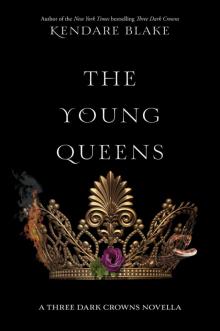 The Young Queens
The Young Queens Queens of Fennbirn
Queens of Fennbirn Antigoddess
Antigoddess The Dogs of Athens
The Dogs of Athens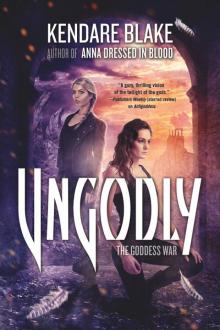 Ungodly
Ungodly Mortal Gods
Mortal Gods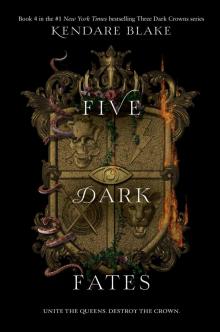 Five Dark Fates
Five Dark Fates Girl of Nightmares
Girl of Nightmares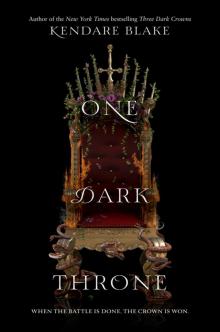 One Dark Throne
One Dark Throne Two Dark Reigns
Two Dark Reigns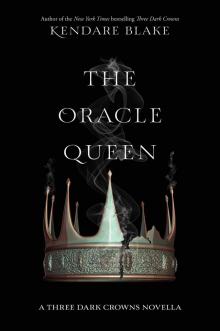 The Oracle Queen
The Oracle Queen Antigoddess gw-1
Antigoddess gw-1